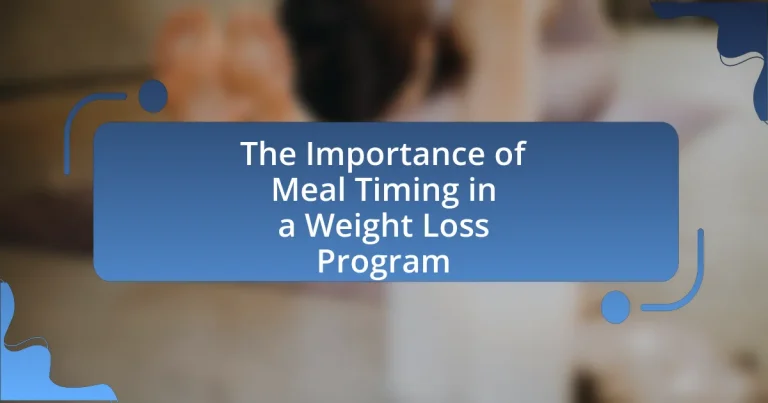Meal timing is a critical factor in weight loss programs, significantly influencing metabolism, hunger regulation, and energy balance. Research shows that consistent meal timing can enhance metabolic efficiency and improve weight loss outcomes, with studies indicating that individuals who eat larger meals earlier in the day tend to lose more weight. The article explores how meal timing affects physiological processes, appetite control, and food choices, while also discussing various strategies such as intermittent fasting and time-restricted eating. Additionally, it addresses challenges individuals may face in adhering to meal timing and offers practical tips for effective implementation in weight loss efforts.

What is the Importance of Meal Timing in a Weight Loss Program?
Meal timing is crucial in a weight loss program as it can influence metabolism, hunger levels, and overall energy balance. Research indicates that consuming meals at consistent times can help regulate the body’s internal clock, leading to improved metabolic efficiency. For instance, a study published in the journal Obesity found that participants who followed a structured meal timing schedule experienced greater weight loss compared to those who ate irregularly. Additionally, timing meals to align with physical activity can enhance fat oxidation and improve workout performance, further supporting weight loss efforts.
How does meal timing influence weight loss outcomes?
Meal timing significantly influences weight loss outcomes by affecting metabolic processes and appetite regulation. Research indicates that consuming meals earlier in the day, as opposed to later, can enhance fat loss and improve insulin sensitivity. A study published in the journal Obesity by Jakubowicz et al. (2013) found that participants who consumed a larger breakfast and smaller dinner lost more weight compared to those who had a smaller breakfast and larger dinner, demonstrating the impact of meal timing on energy balance and weight management. Additionally, aligning meal times with the body’s circadian rhythms can optimize metabolic efficiency, further supporting weight loss efforts.
What physiological processes are affected by meal timing?
Meal timing significantly affects various physiological processes, including metabolism, hormone regulation, and circadian rhythms. Research indicates that consuming meals at specific times can enhance metabolic efficiency, as the body’s ability to process nutrients varies throughout the day. For instance, insulin sensitivity is typically higher in the morning, which means that carbohydrate metabolism is more efficient when meals are consumed earlier in the day. Additionally, meal timing influences the secretion of hormones such as ghrelin and leptin, which regulate hunger and satiety. Studies have shown that irregular meal timing can disrupt circadian rhythms, leading to metabolic disorders and weight gain. Therefore, aligning meal times with the body’s natural biological clock can optimize these physiological processes and support weight loss efforts.
How does meal timing relate to metabolism and energy expenditure?
Meal timing significantly influences metabolism and energy expenditure by affecting hormonal responses and the body’s ability to utilize energy efficiently. Research indicates that consuming meals at regular intervals can enhance metabolic rate, as the body requires energy to digest and process food, a phenomenon known as the thermic effect of food. For instance, a study published in the Journal of Nutritional Biochemistry found that individuals who consumed larger meals earlier in the day experienced greater fat oxidation and improved insulin sensitivity compared to those who ate later. This suggests that aligning meal timing with the body’s circadian rhythms can optimize metabolic processes and energy utilization, ultimately supporting weight loss efforts.
Why is meal timing considered a critical factor in weight loss?
Meal timing is considered a critical factor in weight loss because it influences metabolic processes and hunger regulation. Research indicates that eating at specific times can enhance fat oxidation and improve insulin sensitivity, which are essential for effective weight management. For example, a study published in the journal Obesity found that individuals who consumed their meals earlier in the day experienced greater weight loss compared to those who ate later, highlighting the impact of circadian rhythms on metabolism. Additionally, consistent meal timing can help regulate appetite hormones, reducing the likelihood of overeating and promoting better adherence to dietary plans.
What role does meal timing play in hunger regulation?
Meal timing significantly influences hunger regulation by affecting hormonal responses and metabolic processes. Research indicates that consuming meals at consistent times can enhance satiety and reduce overall calorie intake, as it helps synchronize the body’s internal clock, or circadian rhythm, with eating patterns. A study published in the journal “Obesity” by Dr. Frank A.J.L. Scheer and colleagues found that irregular meal timing can disrupt hunger hormones like ghrelin and leptin, leading to increased appetite and potential weight gain. Therefore, structured meal timing can play a crucial role in managing hunger and supporting weight loss efforts.
How can meal timing impact food choices and portion sizes?
Meal timing significantly impacts food choices and portion sizes by influencing hunger levels and metabolic responses. Research indicates that consuming meals at regular intervals can help regulate appetite hormones, such as ghrelin and leptin, which in turn affects how much food individuals choose to eat. For instance, a study published in the journal “Obesity” found that participants who ate larger meals earlier in the day reported feeling less hungry later, leading to smaller portion sizes at subsequent meals. Additionally, irregular meal timing can lead to increased cravings for high-calorie foods and larger portion sizes, as the body may respond to prolonged fasting with heightened hunger signals. Thus, structured meal timing can promote healthier food choices and more appropriate portion sizes, supporting weight loss efforts.
What are the different meal timing strategies for weight loss?
Different meal timing strategies for weight loss include intermittent fasting, time-restricted eating, and frequent small meals. Intermittent fasting involves cycling between periods of eating and fasting, which has been shown to enhance fat loss and improve metabolic health. Time-restricted eating limits food intake to a specific window each day, often resulting in reduced calorie consumption and improved insulin sensitivity. Frequent small meals, on the other hand, aim to keep metabolism active and prevent hunger, although evidence on its effectiveness is mixed. Research indicates that these strategies can lead to significant weight loss when combined with a balanced diet and regular physical activity.
What is intermittent fasting and how does it work?
Intermittent fasting is an eating pattern that alternates between periods of fasting and eating. This approach works by restricting food intake to specific time windows, which can lead to reduced calorie consumption and improved metabolic health. Research indicates that intermittent fasting can enhance fat loss, improve insulin sensitivity, and promote cellular repair processes. For instance, a study published in the New England Journal of Medicine highlights that intermittent fasting can lead to weight loss and improved metabolic health markers, demonstrating its effectiveness in weight management strategies.
How does the timing of meals throughout the day affect weight loss?
The timing of meals throughout the day significantly affects weight loss by influencing metabolism, hunger hormones, and overall caloric intake. Research indicates that consuming meals at regular intervals can help regulate appetite and prevent overeating, which is crucial for weight management. For instance, a study published in the journal Obesity found that participants who ate earlier in the day lost more weight compared to those who consumed the same number of calories later in the day. This suggests that meal timing can optimize metabolic processes and enhance fat loss. Additionally, aligning meal times with the body’s circadian rhythms may improve insulin sensitivity and fat oxidation, further supporting weight loss efforts.
How can individuals effectively implement meal timing in their weight loss programs?
Individuals can effectively implement meal timing in their weight loss programs by establishing a consistent eating schedule that aligns with their daily activities and metabolic needs. Research indicates that consuming meals at regular intervals, such as every 3-4 hours, can help regulate hunger hormones and improve satiety, which may lead to reduced overall calorie intake. For instance, a study published in the journal “Obesity” found that participants who followed a structured meal timing plan experienced greater weight loss compared to those who did not adhere to a specific schedule. Additionally, incorporating strategies like intermittent fasting, where individuals restrict eating to specific time windows, has shown promise in enhancing fat loss while preserving lean muscle mass.
What are some practical tips for scheduling meals and snacks?
To effectively schedule meals and snacks, plan to eat every 3 to 4 hours to maintain energy levels and prevent overeating. This approach helps regulate hunger hormones and stabilizes blood sugar levels, which is crucial for weight loss. Additionally, designate specific times for meals and snacks, such as breakfast at 8 AM, lunch at 12 PM, and dinner at 6 PM, to create a consistent routine. Research indicates that regular meal timing can enhance metabolic health and support weight management, as shown in studies published in the Journal of Nutrition.
How can one adjust meal timing based on personal lifestyle and preferences?
One can adjust meal timing based on personal lifestyle and preferences by identifying individual daily routines and energy needs. For instance, if a person has a busy morning schedule, they may benefit from a larger breakfast to fuel their day, while someone who exercises in the evening might prefer a meal post-workout for recovery. Research indicates that aligning meal times with circadian rhythms can enhance metabolic health, suggesting that eating earlier in the day may support weight loss more effectively than late-night meals. Additionally, personal preferences, such as social commitments or work hours, should be considered to create a sustainable eating schedule that promotes adherence to a weight loss program.

What challenges might arise with meal timing in a weight loss program?
Meal timing in a weight loss program can present several challenges, including difficulty in maintaining consistency, potential for increased hunger, and social constraints. Consistency is crucial for effective weight loss, and irregular meal timing can disrupt metabolic processes, leading to weight loss plateaus. Research indicates that irregular eating patterns can negatively impact appetite regulation, causing increased hunger and cravings, which may lead to overeating. Additionally, social situations often dictate meal times, making it challenging to adhere to a structured eating schedule, potentially resulting in unplanned calorie intake. These factors collectively complicate the effectiveness of meal timing strategies in achieving weight loss goals.
What common obstacles do people face when adhering to meal timing?
People commonly face several obstacles when adhering to meal timing, including busy schedules, social pressures, and lack of meal planning. Busy schedules often lead to irregular eating patterns, making it difficult to stick to designated meal times. Social pressures, such as dining out with friends or family, can disrupt planned meal timings and encourage unhealthy eating habits. Additionally, a lack of meal planning can result in impulsive eating choices, further complicating adherence to a structured meal timing regimen. These factors collectively hinder individuals’ ability to maintain consistent meal timing, which is crucial for effective weight loss.
How can social situations impact meal timing adherence?
Social situations can significantly impact meal timing adherence by creating pressures that lead individuals to deviate from their planned eating schedules. For instance, social gatherings often involve shared meals that may not align with an individual’s intended meal times, resulting in either delayed eating or consumption of unplanned foods. Research indicates that 70% of individuals report altering their meal timing due to social events, highlighting the influence of social contexts on dietary behaviors. Additionally, the presence of peers can encourage overeating or snacking outside of designated meal times, further disrupting adherence to a structured eating plan.
What strategies can help overcome these challenges?
To overcome challenges related to meal timing in a weight loss program, individuals can implement structured meal schedules, prioritize nutrient timing, and utilize mindful eating practices. Structured meal schedules help regulate hunger and prevent overeating by establishing consistent times for meals and snacks, which can lead to better adherence to dietary goals. Prioritizing nutrient timing, such as consuming carbohydrates around workouts, can enhance energy levels and recovery, supporting weight loss efforts. Mindful eating practices, which involve paying attention to hunger cues and savoring food, can reduce emotional eating and improve overall satisfaction with meals. Research indicates that individuals who follow regular meal patterns are more successful in weight management, as evidenced by a study published in the Journal of Nutrition, which found that consistent meal timing is associated with lower body mass index (BMI) and improved metabolic health.
How does meal timing interact with other weight loss factors?
Meal timing significantly interacts with other weight loss factors such as caloric intake, metabolism, and hormonal regulation. Research indicates that consuming meals at specific times can enhance metabolic responses, influencing how the body processes calories. For instance, a study published in the journal Obesity found that individuals who consumed their largest meal earlier in the day experienced greater weight loss compared to those who ate later, suggesting that meal timing can optimize energy expenditure and fat oxidation. Additionally, meal timing affects insulin sensitivity; eating in alignment with the body’s circadian rhythms can improve insulin response, further aiding weight loss efforts. Thus, strategic meal timing can synergistically enhance the effectiveness of dietary and exercise interventions in a weight loss program.
What is the relationship between meal timing and physical activity?
Meal timing significantly influences physical activity by affecting energy levels and metabolic responses. Consuming meals at strategic times can enhance performance during exercise, as eating before physical activity provides the necessary fuel for optimal energy output. Research indicates that individuals who align their meal timing with their exercise schedule tend to experience improved endurance and strength, as seen in a study published in the Journal of the International Society of Sports Nutrition, which found that pre-exercise meals can enhance performance metrics. Additionally, meal timing can impact recovery; consuming protein and carbohydrates post-exercise aids in muscle repair and glycogen replenishment, further supporting physical activity.
How does sleep quality affect meal timing effectiveness?
Sleep quality significantly impacts meal timing effectiveness by influencing metabolic processes and hunger regulation. Poor sleep can disrupt hormones such as leptin and ghrelin, leading to increased appetite and altered food preferences, which can undermine the benefits of strategically timed meals. Research indicates that individuals with inadequate sleep tend to consume more calories, particularly from high-carbohydrate and high-fat foods, which can hinder weight loss efforts. A study published in the journal “Sleep” by St-Onge et al. (2016) found that sleep restriction led to increased caloric intake and reduced fat oxidation, demonstrating the critical role of sleep in optimizing meal timing for weight management.

What evidence supports the effectiveness of meal timing in weight loss?
Research indicates that meal timing can significantly influence weight loss outcomes. A study published in the journal Obesity by Jakubowicz et al. (2013) found that participants who consumed a larger breakfast and smaller dinner lost more weight compared to those who had a smaller breakfast and larger dinner, suggesting that meal timing affects metabolic processes and appetite regulation. Additionally, a review in the Annual Review of Nutrition by St-Onge et al. (2017) highlighted that eating patterns, including meal frequency and timing, can impact energy balance and body composition. These findings support the notion that strategic meal timing can enhance weight loss efforts.
What research studies have been conducted on meal timing and weight loss?
Research studies on meal timing and weight loss indicate that specific eating patterns can significantly influence weight management. One notable study published in the journal Obesity by Dr. Courtney M. Peterson and colleagues in 2015 found that time-restricted feeding, where participants consumed all their calories within an 8-hour window, led to a reduction in body weight and fat mass compared to those who ate normally throughout the day. Another study by Dr. Frank A.J.L. Scheer and his team in 2013, published in the American Journal of Clinical Nutrition, demonstrated that eating at irregular times can disrupt metabolic processes, leading to weight gain. Additionally, a systematic review in 2020 by Dr. S. A. Almoosawi et al. in the journal Nutrients highlighted that meal timing, particularly breakfast consumption, is associated with better weight loss outcomes. These studies collectively support the notion that meal timing plays a crucial role in effective weight loss strategies.
What were the key findings from these studies?
The key findings from studies on the importance of meal timing in a weight loss program indicate that meal timing significantly influences weight loss outcomes and metabolic health. Research shows that individuals who consume meals earlier in the day tend to lose more weight compared to those who eat later, as demonstrated in a study published in the journal Obesity, which found that participants who ate breakfast and lunch earlier lost an average of 3.5% more body weight over 12 weeks. Additionally, studies suggest that aligning meal times with circadian rhythms enhances fat oxidation and improves insulin sensitivity, further supporting weight loss efforts. These findings underscore the critical role of meal timing in effective weight management strategies.
How do these findings compare to traditional calorie restriction methods?
The findings regarding meal timing suggest that it may be more effective for weight loss than traditional calorie restriction methods. Research indicates that aligning food intake with the body’s circadian rhythms can enhance metabolic health and promote fat loss, whereas traditional calorie restriction often focuses solely on reducing caloric intake without considering timing. A study published in the journal Obesity by Garaulet et al. (2013) found that individuals who consumed their meals earlier in the day experienced greater weight loss compared to those who ate later, highlighting the potential advantages of meal timing over conventional calorie restriction strategies.
What are the long-term effects of meal timing on weight management?
Meal timing significantly influences long-term weight management by affecting metabolic processes and appetite regulation. Research indicates that individuals who consume meals earlier in the day tend to have better weight control compared to those who eat later, as evidenced by a study published in the journal Obesity, which found that participants who ate breakfast regularly had lower body mass indexes (BMIs) and improved metabolic health markers. Additionally, consistent meal timing can enhance circadian rhythms, leading to improved insulin sensitivity and reduced fat accumulation, as supported by findings from the American Journal of Clinical Nutrition. These effects underscore the importance of meal timing as a strategic component in effective weight management over the long term.
How does meal timing influence weight maintenance after weight loss?
Meal timing significantly influences weight maintenance after weight loss by affecting metabolic processes and hunger regulation. Research indicates that individuals who consume meals at consistent times are more likely to maintain their weight loss, as regular meal patterns can enhance metabolic efficiency and reduce the likelihood of overeating. A study published in the journal Obesity by Garaulet et al. (2013) found that participants who ate their main meal later in the day experienced greater weight regain compared to those who consumed it earlier. This suggests that aligning meal timing with the body’s circadian rhythms can play a crucial role in sustaining weight loss.
What are the potential health benefits associated with proper meal timing?
Proper meal timing can lead to several health benefits, including improved metabolic regulation, enhanced weight management, and better overall health outcomes. Research indicates that aligning meal times with the body’s circadian rhythms can optimize insulin sensitivity and glucose metabolism, which are crucial for weight loss and preventing metabolic disorders. A study published in the journal “Cell Metabolism” by researchers at the Salk Institute found that time-restricted feeding improved weight loss and metabolic health in prediabetic men. Additionally, consistent meal timing can help regulate appetite hormones, reducing hunger and promoting satiety, which further supports weight loss efforts.
What practical tips can enhance the effectiveness of meal timing in weight loss?
To enhance the effectiveness of meal timing in weight loss, individuals should consider eating smaller, more frequent meals throughout the day. This approach can help regulate hunger hormones and maintain steady energy levels, which may prevent overeating. Research indicates that eating every 3-4 hours can improve metabolic rate and promote fat loss, as supported by a study published in the Journal of Nutrition, which found that frequent meals can lead to better weight management outcomes. Additionally, aligning meal times with the body’s circadian rhythm, such as consuming larger meals earlier in the day, can optimize metabolic processes and support weight loss efforts.
How can meal prep and planning support meal timing strategies?
Meal prep and planning can significantly enhance meal timing strategies by ensuring that nutritious meals are readily available at optimal times throughout the day. This proactive approach allows individuals to adhere to specific eating schedules, which can help regulate metabolism and control hunger levels. Research indicates that consistent meal timing can improve satiety and reduce overall caloric intake, thereby supporting weight loss efforts. For instance, a study published in the journal Obesity found that individuals who followed structured meal times experienced greater weight loss compared to those with irregular eating patterns. By preparing meals in advance, individuals can avoid impulsive eating and maintain their planned meal schedule, ultimately reinforcing the effectiveness of their weight loss program.
What are some common pitfalls to avoid when implementing meal timing?
Common pitfalls to avoid when implementing meal timing include neglecting individual needs, adhering too rigidly to a schedule, and overlooking food quality. Neglecting individual needs can lead to ineffective meal timing strategies, as each person’s metabolism and lifestyle differ significantly. Adhering too rigidly to a schedule may cause stress and lead to unhealthy eating behaviors, such as binge eating when meals are missed. Overlooking food quality can result in poor nutritional choices, undermining the benefits of meal timing. Research indicates that meal timing can influence metabolic health, but it must be tailored to individual preferences and nutritional needs for optimal results.


